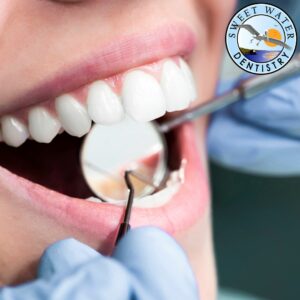How Long Do Fillings, Crowns, And Other Dental Restorations Last?
At Sweet Water Dentistry, we understand that dental restorations like fillings and crowns are essential investments in your oral health, and you want to know how long they’ll serve you. Generally, with proper care and maintenance, fillings can last up to 15 years, while crowns usually remain robust for about 10-15 years. Each restoration’s lifespan can vary based on factors such as your oral hygiene, diet, and the material used for the restoration. Dr. Phillip N. Greer, D.D.S., and his dedicated team at Sweet Water Dentistry are committed to providing you with the highest quality dental care, ensuring your restorations stand the test of time. Whether you’re a long-time resident or new to the Fairhope area, we invite you to become part of our dental family, where we blend expertise with a comforting touch to make all your visits pleasant and productive.
Have you ever wondered how long fillings, crowns, and other dental restorations actually last? It’s a common concern and something worth understanding, especially if you’re like many of us who enjoy a good caramel apple without worrying about whether it’s going to take a piece of your medically enhanced smile with it.
Here at Sweet Water Dentistry, located in the serene town of Fairhope, Alabama, we not only want to keep your pearly whites in top shape but also make sure you’re well-informed about the treatments you receive. Let’s dive into the nitty-gritty details of dental restorations, shall we?
Fillings: The Everyday Warriors
Fillings are like the foot soldiers of dental restorations, tirelessly working to keep cavities at bay. But just how long can you expect them to last?
Types of Fillings and Their Lifespan
- Amalgam Fillings (Silver Fillings)
- Lifespan: 10-15 years
- Pros: Durable and less expensive
- Cons: Noticeable color and potential for cracking over time
- Composite Fillings (Tooth-Colored Fillings)
- Lifespan: 5-10 years
- Pros: Aesthetically pleasing and bonds well with tooth structure
- Cons: More expensive, and may stain over time
- Gold Fillings
- Lifespan: 15-30 years
- Pros: Extremely durable and resistant to wear
- Cons: Very noticeable and the most expensive option
- Ceramic Fillings
- Lifespan: 10-15 years
- Pros: Highly stain-resistant and aesthetically pleasing
- Cons: Can be more brittle and expensive than composite fillings
In general, how long your fillings last will depend on a host of factors—including your oral hygiene habits, diet, and even your bite. Regular dental check-ups with Dr. Phillip N. Greer at Sweet Water Dentistry can help spot trouble before it starts.
Crowns: The Regal Protectors
Think of crowns as the royal guards of your teeth. They’re designed to protect and restore heavily damaged teeth, providing both cosmetic and functional benefits.
Types of Crowns and Their Lifespan
- Ceramic or Porcelain Crowns
- Lifespan: 10-15 years
- Pros: Best for natural aesthetics, particularly for front teeth
- Cons: Less durable than metal crowns
- Porcelain Fused to Metal (PFM) Crowns
- Lifespan: 10-15 years
- Pros: Combines strength and natural appearance
- Cons: Metal understructure may show as gums recede
- Gold or Metal Alloys Crowns
- Lifespan: 20+ years
- Pros: Extremely durable and biocompatible with minimal wear
- Cons: Appearance can be a drawback for visible teeth
- Zirconia Crowns
- Lifespan: 10-15 years
- Pros: High strength and good aesthetics
- Cons: Can be more expensive and less transparent than other options
Crowns are resilient, but they’re not invincible. They need regular maintenance, just like natural teeth. Good oral hygiene and avoiding hard foods like ice or popcorn kernels can extend their lifespan considerably.
Bridges: The Tooth-Space Conquerors
When you’re missing a tooth or two, bridges are often the go-to solution to fill the gap—literally and metaphorically—restoring your smile and functionality.
Types of Bridges and Their Lifespan
- Traditional Dental Bridges
- Lifespan: 10-15 years
- Pros: A straightforward solution for replacing missing teeth
- Cons: Requires modification of adjacent teeth
- Cantilever Bridges
- Lifespan: 5-10 years
- Pros: Useful when there are adjacent teeth on only one side of the missing tooth
- Cons: Increased risk of fractures due to less support
- Maryland Bonded Bridges
- Lifespan: 5-10 years
- Pros: Minimal alteration to adjacent teeth
- Cons: Less durable and may require frequent adjustments
- Implant-Supported Bridges
- Lifespan: 15+ years
- Pros: High stability and doesn’t affect adjacent teeth
- Cons: More invasive and costly procedure
As resilient as bridges are, they are susceptible to wear and tear. Regular visits to Sweet Water Dentistry can ensure your bridges remain in tip-top shape, extending their lifespan significantly.
Inlays and Onlays: The Custom Comforters
Inlays and onlays are often referred to as “indirect fillings.” They’re custom-made to fit the specific cavity or damage on your tooth, providing more strength and longevity than a traditional filling.
Lifespan and Material Choices
- Composite Inlays/Onlays
- Lifespan: 5-10 years
- Pros: Tooth-colored and blends well
- Cons: Less durable than ceramic or gold
- Ceramic or Porcelain Inlays/Onlays
- Lifespan: 10-15 years
- Pros: Highly aesthetic and stain-resistant
- Cons: Can be brittle and expensive
- Gold Inlays/Onlays
- Lifespan: 20+ years
- Pros: Superior durability and biocompatibility
- Cons: Color doesn’t blend with natural teeth
Veneers: The Cosmetic Superstars
Veneers are the Hollywood celebrities of dental restorations. Made primarily from porcelain or composite resin, they offer stunning results for those looking to improve the appearance of their smile.
Types and Lifespan of Veneers
- Porcelain Veneers
- Lifespan: 10-15 years
- Pros: Highly natural appearance
- Cons: Can be expensive and may require some tooth reduction
- Composite Veneers
- Lifespan: 5-7 years
- Pros: Less expensive and quicker to apply
- Cons: Less durable and more prone to staining
Despite being primarily for cosmetic purposes, veneers are quite resilient. With good care, they can last a decade or more. Regular check-ups and touch-ups at Sweet Water Dentistry will help keep them in fabulous condition.
Dental Implants: The Titans of Tooth Replacement
If there’s a kingpin among dental restorations, it’s got to be dental implants. These titans offer a permanent solution to tooth loss, blending seamlessly with your natural teeth and providing unmatchable durability.
Components and Lifespan
- Implant Post
- Material: Titanium or Zirconia
- Lifespan: 25+ years
- Pros: Permanently anchors replacement tooth
- Cons: Requires minor surgery for placement
- Abutment
- Material: Various (usually metal or ceramic)
- Lifespan: Same as implant post
- Pros: Connects the implant post to the crown
- Cons: Dependent on the implant post for stability
- Crown
- Material: Ceramic or Porcelain
- Lifespan: 10-15 years (easily replaced while keeping the implant post)
- Pros: Provides a natural look and function
- Cons: Subject to wear and damage like natural teeth
Dentures: The Reliable Stand-Ins
For those missing multiple teeth, dentures can be a life-changing solution. They come in multiple forms and can significantly impact your quality of life.
Types and Lifespan of Dentures
- Full Dentures
- Lifespan: 5-10 years
- Pros: Complete teeth replacement
- Cons: May require periodic adjustments for fit
- Partial Dentures
- Lifespan: 5-10 years
- Pros: Fill gaps left by missing teeth while preserving existing ones
- Cons: Can become loose or uncomfortable over time
- Implant-Supported Dentures
- Lifespan: 10-15 years for the denture, 25+ years for the implants
- Pros: Greater stability and chewing efficiency
- Cons: More costly and requires surgery
Factors Affecting Longevity of Dental Restorations
Several factors can influence how long your dental restorations last:
Oral Hygiene
Good oral hygiene habits can’t be stressed enough. Regular brushing, flossing, and mouthwash can significantly extend the life of your fillings, crowns, and other dental work.
Diet
Your diet plays a vital role too. Consuming sugary or acidic foods and beverages creates an environment in which harmful bacteria thrive, potentially damaging both natural teeth and restorations.
Lifestyle Choices
Habits like smoking or chewing on hard objects (ice, pens, etc.) can significantly shorten the lifespan of dental restorations. Consider quitting these habits for your overall health and dental longevity.
Regular Dental Visits
Routine check-ups allow Dr. Phillip Greer to perform essential maintenance and spot potential problems early. Small issues can often be resolved before they become major headaches—or toothaches, as the case may be!
Conclusion: Timely Care for Lasting Results
Understanding the lifespan of your dental restorations helps you manage your expectations and maintain your oral health effectively. Whether it’s a filling, crown, veneer, or dental implant, knowing how long each lasts allows you to plan for the future better.
At Sweet Water Dentistry, we take pride in treating every patient with the utmost care and respect. From our relaxing environment down by the bay to our commitment to compassionate, high-quality dental care, we strive to make every visit a pleasant experience. So why not schedule your appointment today? Contact us at (251) 210-2773 or visit us in Fairhope, AL. We’re here to help you smile brighter for longer.
To schedule a consultation and learn more about your dental implant options, contact Sweet Water Dentistry today!
Visit us for expert care:
Sweet Water Dentistry
📍 5915 Sweetwater Cir, Fairhope, AL 36532
🌐 sweetwatersmile.com
📞 Call or Text: (251) 210-2773
Follow us on Facebook and Instagram for the latest updates and special offers!
At Sweet Water Dentistry, we accept most insurance plans and welcome patients of all ages. Have questions? Just ask. We look forward to welcoming you to our dental family.



